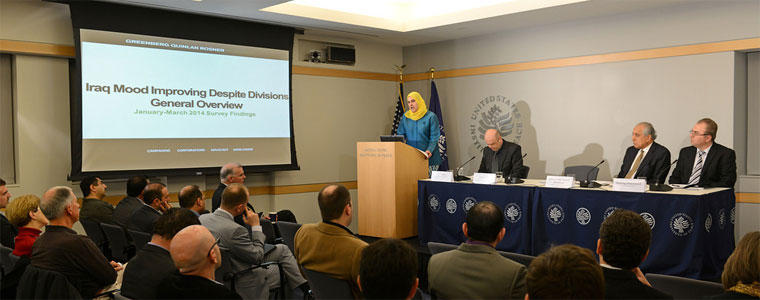Consolidating Democratic Gains or Cementing Sectarian Divides?
Prospects for Iraq’s April 30 Elections
The United States Institute of Peace (USIP) and the National Democratic Institute (NDI) were pleased to present a panel of experts to share their perspectives on Iraq’s rapidly approaching April 30 national elections, which took place against a backdrop of sharpening sectarian divisions and an increasingly precarious security environment.

Later this month, Iraqis will go to the polls to elect new members of the Council of Representatives, the country’s legislative body, as well as members of provincial assemblies in the Kurdistan Regional Government (KRG). Preparations for the April 30 elections have been turbulent to date, with looming questions regarding the ability of displaced Iraqis to participate in the polls; the controversial disqualification of certain candidates; and the now-rescinded resignation of the commissioners of the Independent High Electoral Commission, the body charged with organizing the polls. Sectarian rhetoric and ethnic appeals have also characterized the campaign messages of certain candidates and party coalitions.
Amid sharpening sectarian divisions and an increasingly precarious security environment, the United States Institute of Peace (USIP) and the National Democratic Institute (NDI) were pleased to present a panel of experts to share their perspectives on Iraq’s national elections, and what they mean for the country’s democratic development.
NDI recently conducted a nationwide pre-election poll to gauge citizen perspectives on prospects for peaceful elections; anticipated voter participation rates and shifts in partisan support; and longer-term issues such as perceived improvements or declines in cross-cutting issues such as security, basic service provision, employment and education. The results reveal distinct regional divides and opinions on the country’s state of play ahead of these critical elections.
NDI’s Iraq-based Resident Director, Elvis Zutic, discussed the poll’s key findings and his views on the country’s political, electoral and security contexts. Discussants complemented his assessment with analyses of the importance of these elections, and how the outcome of the polls impacted Iraq’s broader development progress and its relationships with regional and international actors.
Speakers
Elvis Zutic
Resident Director, NDI Iraq
Sarhang Hamasaeed
Senior Program Officer, Middle East and North Africa Programs, USIP
Ambassador Zalmay Khalilzad
Former Ambassador to Afghanistan, Iraq, and the United Nations Counselor, Center for Strategic and International Studies
Manal Omar, Moderator
Associate Vice President for the Middle East and Africa, USIP



